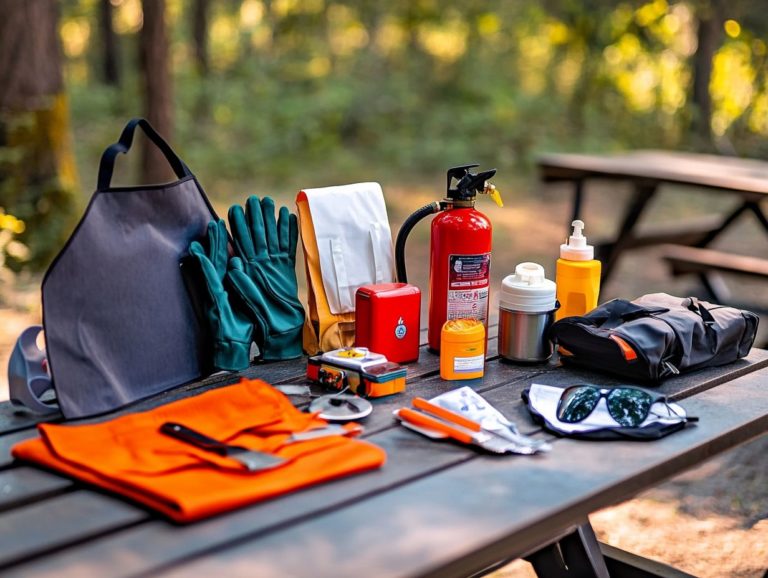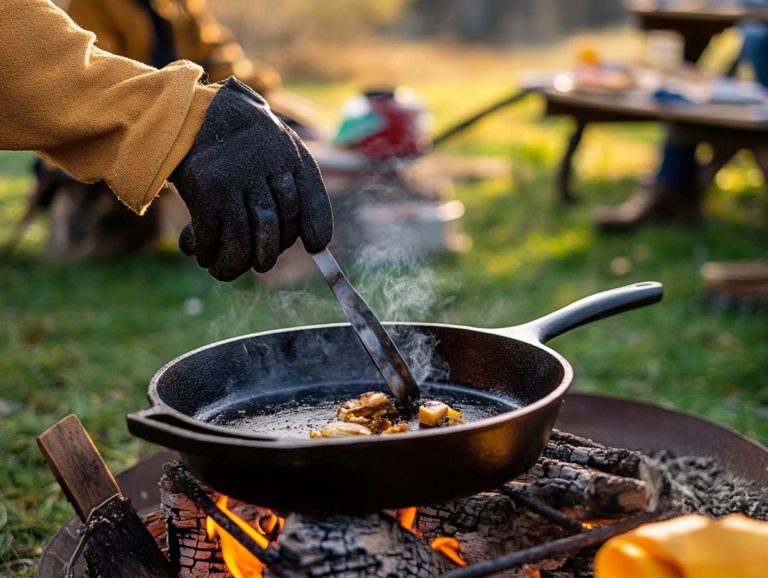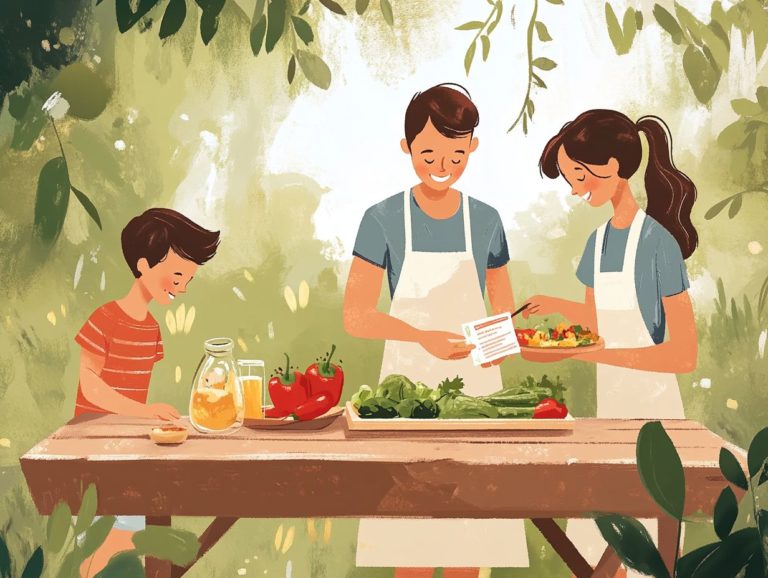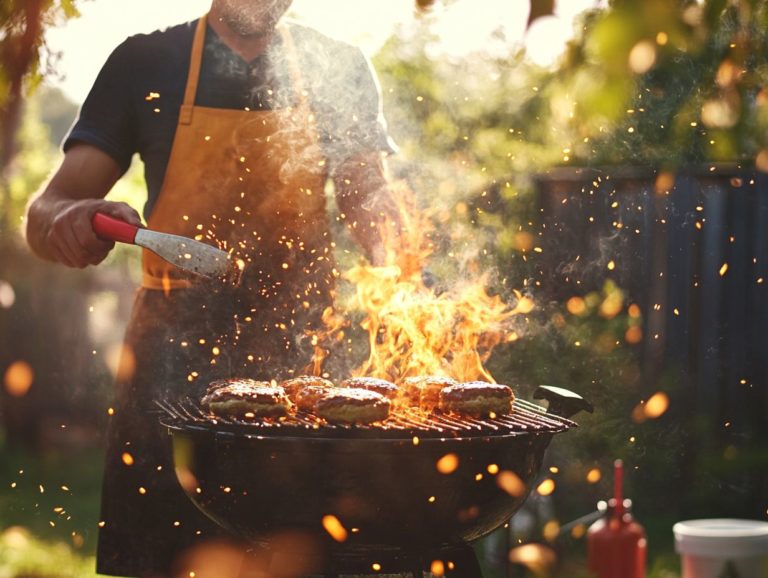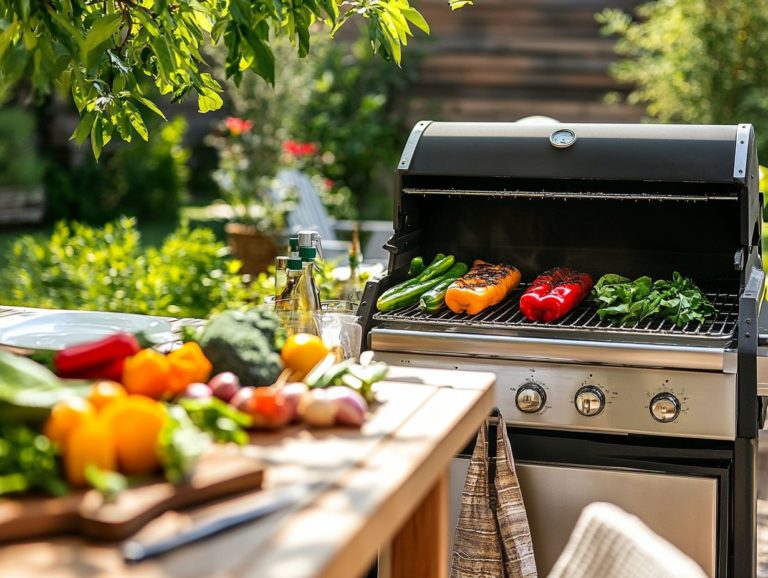Stay Safe: Essential Tips for Outdoor Cooking
Outdoor cooking invites you to immerse yourself in nature while enjoying the company of friends and family. However, it comes with its own unique set of challenges, especially when considering campsite cooking.
Understanding the benefits and risks is vital for an unforgettable experience, particularly regarding fire safety and food safety. This article presents essential safety tips covering everything from selecting the right equipment and ensuring fire safety to implementing food safety measures and proper cooking techniques.
It explores various outdoor cooking methods, shares strategies for menu planning, and offers insights on clean-up and maintenance, including grilling tips for summer camping. Whether you’re grilling in your backyard or camping in the wild with friends, these tips are designed to help you savor every moment safely.
Contents
- Key Takeaways for Safe Outdoor Cooking:
- Why Knowing the Benefits and Risks Matters
- Essential Safety Tips
- Types of Outdoor Cooking
- Preparation and Planning
- Clean Up and Maintenance
- Frequently Asked Questions
- What are some general safety tips for outdoor cooking?
- How can I avoid food-borne illnesses while cooking outdoors?
- What should I do if a grease fire occurs while cooking outdoors?
- Are there safety precautions I should take when using a grill for outdoor cooking?
- How can I prevent burns while cooking outdoors?
- What should I do to safely extinguish a fire after cooking outdoors?
Key Takeaways for Safe Outdoor Cooking:
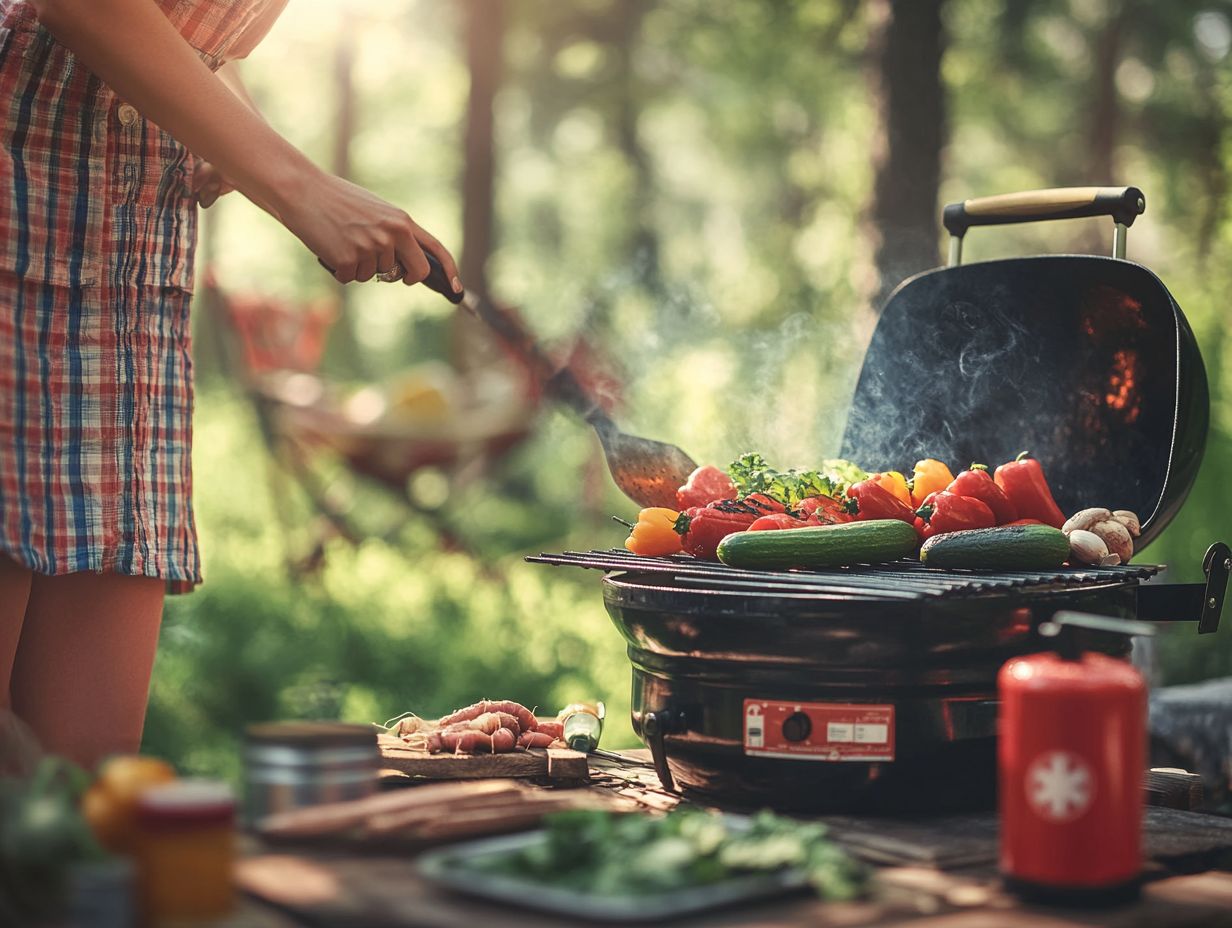
- Always use proper equipment and tools, such as a reliable camp stove and a cooking thermometer, when cooking outdoors to prevent accidents and injuries.
- Practice fire safety and prevention measures, like keeping a fire extinguisher nearby, staying informed about local firewood regulations, and never leaving a campfire unattended.
- Ensure food safety by properly storing, handling, and cooking food, especially for campfire recipes, to prevent foodborne illnesses.
Why Knowing the Benefits and Risks Matters
Understanding the benefits and risks tied to campsite cooking and outdoor grilling is essential for elevating your outdoor experience. To ensure safety while cooking in the great outdoors, it’s important to follow safety tips for open flame cooking. Cooking outdoors deepens your connection with nature and allows you to whip up delightful campfire recipes like s’mores and perfectly grilled vegetables over an open flame.
Outdoor cooking can also pose certain risks, including fire hazards, food poisoning, and unexpected wildlife encounters. To stay safe, it’s crucial to be aware of the top risks of outdoor cooking and how to avoid them. Neglecting fire safety or food handling practices can lead to precarious situations, especially concerning grilling accidents.
Therefore, it’s vital to equip yourself with knowledge about keeping cooking areas clean and the right gear to minimize these risks. For more detailed guidance, check out best practices for outdoor cooking safety to ensure your summer camping adventure is enjoyable and memorable.
Essential Safety Tips
Prioritizing essential safety tips, like using bug repellent and carrying a first aid kit, is crucial for an enjoyable outdoor cooking experience. Whether you’re summer camping in Texas or heading out on a backpacking adventure, mastering fire safety and food prep can greatly minimize risks associated with campsite cooking, including following the top 10 safety tips for outdoor cooking equipment.
Key safety measures include:
- Carrying a well-stocked first aid kit for emergencies,
- Practicing good cooking sanitation, and
- Staying informed about local firewood regulations.
Proper Equipment and Tools
Having the right equipment and tools is paramount for effective campsite cooking. This ensures both your safety and the delight of your meals. Invest in essential gear, such as a reliable camp stove, a cooking thermometer to monitor food temperatures, and a bear box for safely storing food your best defense against curious wildlife.
The camp stove is your culinary ally, allowing you to create savory dishes effortlessly. Meanwhile, the cooking thermometer is vital for ensuring meats reach the appropriate internal temperatures, helping you prevent foodborne illnesses and enhancing overall meal safety.
A high-quality cutting board and a set of sharp knives are essential for efficient food preparation. They enable precise chopping while minimizing the risk of accidents. And let s not forget a portable campfire pit, which brings a touch of tradition to your outdoor cooking experience, perfect for roasting and grilling.
When combined, these tools not only elevate your campsite cooking but also ensure a safe and enjoyable outdoor culinary adventure.
Get ready to fire up your camp stove and make unforgettable memories outdoors!
Fire Safety and Prevention
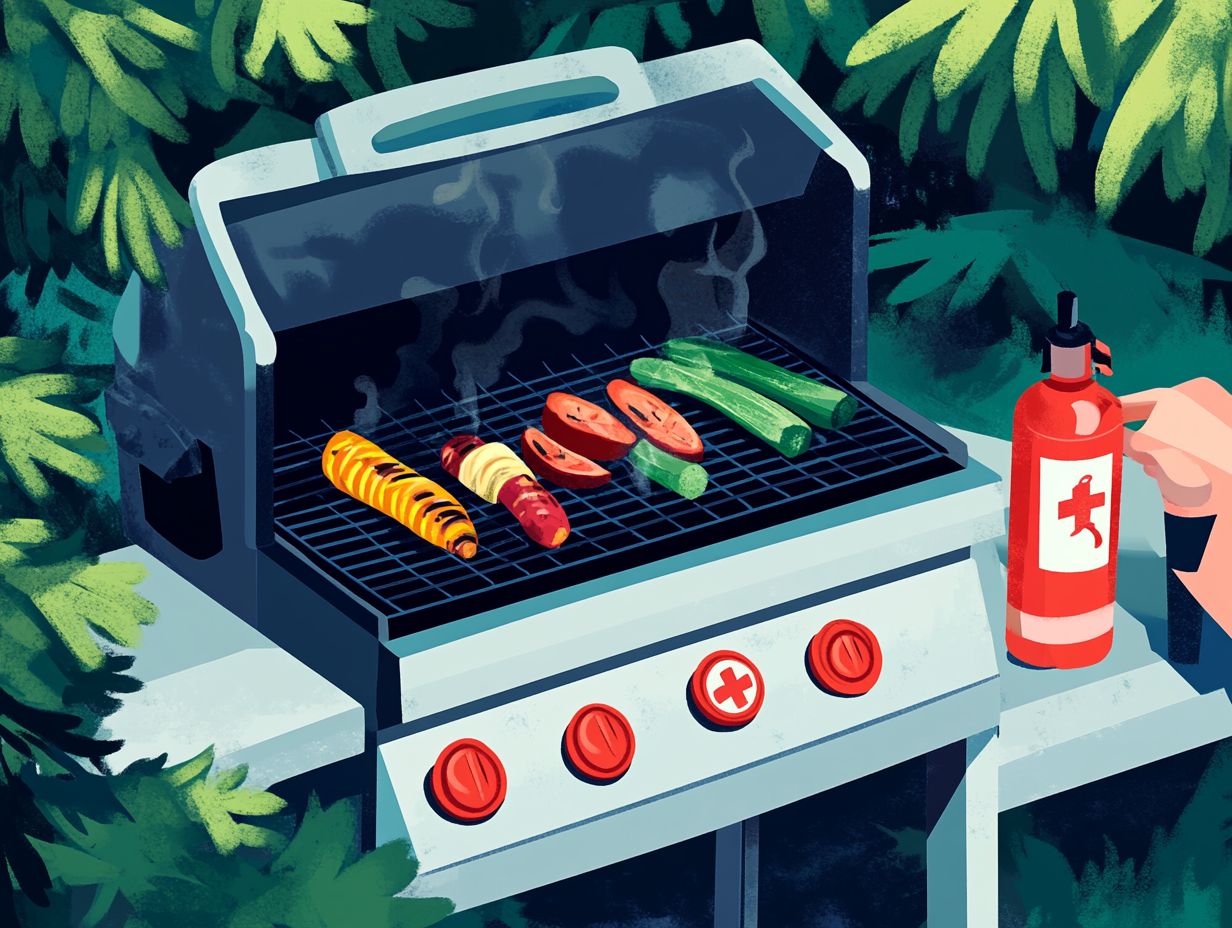
Fire safety and prevention are crucial when cooking at a campsite. To create a safe environment for everyone involved, consider these tips for cooking with kids outdoors safely.
Always check local firewood regulations and use only the approved types to minimize the risk of accidental fires. Responsible campers recognize that following these rules protects their safety and the surrounding environment.
Properly extinguishing campfires after use is essential to prevent potential wildfires. When using fire-related equipment, such as portable grills and fire pits, maintain a safe distance from tents and other flammable materials.
Keep a water source nearby; it can be lifesaving in the event of an unexpected flare-up. Following guidelines on firewood collection and campsite management is paramount for memorable and secure outdoor adventures.
Food Safety Measures
Implementing food safety measures is essential when you’re cooking at the campsite. It’s not just about avoiding food poisoning; knowing what to do in case of an outdoor cooking accident ensures that your meals are as nutritious as they are delicious.
Using a cooking thermometer is key to ensuring all foods, including eggs and vegetables, reach the safe temperatures needed before you dig in.
Set up designated cooking and eating areas to minimize mixing raw and cooked foods, known as cross-contamination. Wash your hands and surfaces regularly with soap and water.
Keep perishable items at safe temperatures, ideally below 40 F. Make good use of coolers or ice packs whenever you can.
Proper food storage and preparation techniques are crucial for cooking sanitation. Neglecting these practices can lead to serious health risks.
Start using these food safety practices in your camping routine today! For more tips, check out staying safe while cooking in remote locations and enjoy the flavors of nature while staying safe and healthy.
Types of Outdoor Cooking
Embracing the art of outdoor cooking can significantly elevate your summer camping experience. It offers a delightful array of culinary adventures that enhance the joy of being immersed in nature.
Master traditional campsite cooking methods, like grilling mouthwatering BBQ over an open campfire, or experiment with modern outdoor grilling techniques using a gas grill or charcoal setup. The possibilities are endless, from preparing delicious s’mores to grilling flavorful skewers.
By exploring various cooking styles and methods, you can indulge in a diverse range of dishes while maintaining that vital connection to the great outdoors.
Grilling, Camping, and More
Grilling is the quintessential method for outdoor cooking. It transforms your summer camping experience into a culinary adventure where you can prepare mouthwatering campfire meals effortlessly.
Whether you re firing up a portable charcoal grill or cooking over an open flame, there s a world of techniques to explore. Mastering the art of indirect grilling yields perfectly cooked meats, while direct grilling provides a speedy way to sear those beloved burgers and hot dogs.
For those with a taste for adventure, consider cooking skewers brimming with marinated vegetables and tender meats. This not only adds delightful flavor but harmonizes beautifully with the natural surroundings.
Preparation is key; marinating your proteins, such as chicken or beef, in advance elevates flavors and cuts down on cooking time. Don t forget to pack essential grilling tools, like tongs and fire starters, for a safe and enjoyable experience.
By embracing these techniques, you ll enrich your culinary repertoire and foster camaraderie as you share meals beneath the stars.
Preparation and Planning
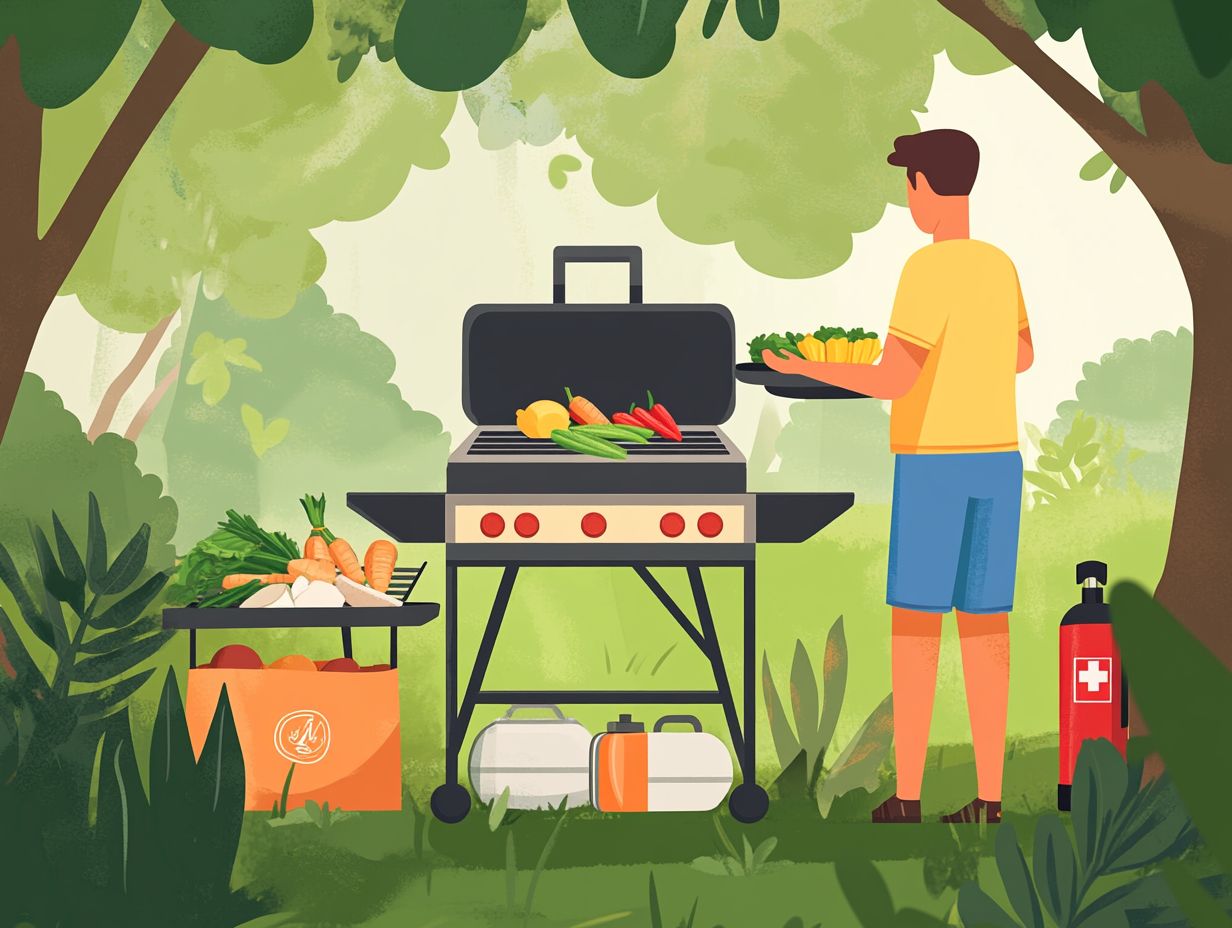
Effective preparation and planning are crucial for achieving a successful camping experience, particularly in the realm of menu planning and food preparation. By crafting a well-considered menu, you can ensure that you have all the necessary ingredients at your disposal, minimizing food waste and enhancing cooking sanitation.
Integrating camping tips into your planning process will undoubtedly elevate your outdoor cooking experience, making it not only smoother but also more enjoyable.
Menu Planning and Food Preparation
Menu planning and food preparation are essential elements of any camping trip. Selecting recipes suited for summer camping helps you incorporate safe food handling methods into your cooking routine. This upholds high standards of sanitation, setting the stage for a successful outdoor cooking experience.
Focus on recipes that feature ingredients which are easy to store and prepare. Consider dishes that require minimal refrigeration or can be crafted from shelf-stable items. Effective quantity management is crucial here ensure there’s enough to satisfy everyone without leaving behind excess waste. Not only does this save space, but it also simplifies clean-up.
Food safety while cooking cannot be overstated. Always wash your hands, prepare food on clean surfaces, and keep raw and cooked ingredients separate. By integrating these savvy strategies, you can indulge in flavorful meals that delight everyone while prioritizing health and sanitation.
Clean Up and Maintenance
Keeping your campsite clean is key to a great experience! Maintaining cleanliness in your campsite cooking is essential, not just for your safety but also for the preservation of the environment. Properly disposing of waste, including leftover food and packaging, is crucial for keeping the campsite tidy and minimizing the risk of attracting wildlife.
Cleaning your cooking equipment properly keeps it in excellent condition for your next adventure.
Proper Disposal of Waste and Cleaning Tips
Proper disposal of waste and effective cleaning are crucial for maintaining hygiene and preventing wildlife encounters during your camping trips. Ensure that all food waste is disposed of correctly ideally in a bear box to significantly reduce the risk of attracting animals while promoting cooking sanitation.
Remember, leaving food scraps or trash behind can create serious health risks for both campers and wildlife. Regularly wash your cooking utensils with biodegradable soap and rinse them with hot water to mitigate harmful bacteria. Using dedicated trash bags for recyclables can also minimize landfill waste.
By maintaining a clean campsite, you contribute to a healthier ecosystem and elevate your own camping experience, free from the concerns of foodborne illnesses. Engaging everyone in proper sanitation practices fosters camaraderie and a shared sense of responsibility, paramount for enjoyable outdoor adventures.
Frequently Asked Questions

-
What are some general safety tips for outdoor cooking?
Some general safety tips for outdoor cooking include keeping a fire extinguisher nearby, wearing heat-resistant gloves, and never leaving a fire unattended.
-
How can I avoid food-borne illnesses while cooking outdoors?
To avoid food-borne illnesses, always wash your hands before and after handling food, cook meat thoroughly, and use separate utensils and cutting boards for raw and cooked foods.
-
What should I do if a grease fire occurs while cooking outdoors?
If a grease fire occurs while cooking outdoors, turn off the heat source and cover the flames with a metal lid or baking sheet. Do not use water to put out the fire as it can cause the flames to spread.
Get ready for your next outdoor adventure with these tips!
Are there safety precautions I should take when using a grill for outdoor cooking?
Yes! Keep the grill at least 10 feet away from any structures.
Make sure children and pets are a safe distance away. Never leave the grill unattended!
How can I prevent burns while cooking outdoors?
Use long-handled utensils to keep your hands safe from heat.
Wear heat-resistant gloves and avoid loose clothing that could catch fire!
What should I do to safely extinguish a fire after cooking outdoors?
Douse the fire with water and stir the ashes.
Make sure to douse it again and ensure the fire is completely out before leaving!

